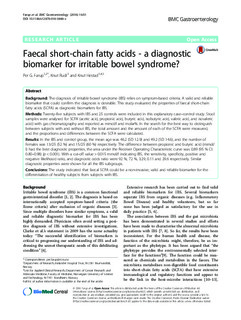| dc.contributor.author | Farup, Per Grønaas | |
| dc.contributor.author | Rudi, Knut | |
| dc.contributor.author | Hestad, Knut | |
| dc.date.accessioned | 2016-09-19T13:45:56Z | |
| dc.date.accessioned | 2016-09-20T08:05:10Z | |
| dc.date.available | 2016-09-19T13:45:56Z | |
| dc.date.available | 2016-09-20T08:05:10Z | |
| dc.date.issued | 2016 | |
| dc.identifier.citation | BMC Gastroenterology 2016, 16:51 | nb_NO |
| dc.identifier.issn | 1471-230X | |
| dc.identifier.uri | http://hdl.handle.net/11250/2408567 | |
| dc.description.abstract | Background
The diagnosis of irritable bowel syndrome (IBS) relies on symptom-based criteria. A valid and reliable biomarker that could confirm the diagnosis is desirable. This study evaluated the properties of faecal short-chain fatty acids (SCFA) as diagnostic biomarkers for IBS.
Methods
Twenty-five subjects with IBS and 25 controls were included in this explanatory case–control study. Stool samples were analysed for SCFA (acetic acid, propionic acid, butyric acid, isobutyric acid, valeric acid, and isovaleric acid) with gas chromatography and reported as mmol/l and molar%. In the search for the best way to distinguish between subjects with and without IBS, the total amount and the amount of each of the SCFA were measured, and the proportions and differences between the SCFA were calculated.
Results
In the IBS and control group, the mean age was 46.2 (SD 12.9) and 49.2 (SD 14.6), and the number of females was 13/25 (52 %) and 15/25 (60 %) respectively. The difference between propionic and butyric acid (mmol/l) had the best diagnostic properties, the area under the Receiver Operating Characteristic curve was 0.89 (95 % CI: 0.80–0.98) (p < 0.001). With a cut-off value > 0.015 mmol/l indicating IBS, the sensitivity, specificity, positive and negative likelihood ratio, and diagnostic odds ratio were 92 %, 72 %, 3.29, 0.11 and 29.6 respectively. Similar diagnostic properties were shown for all the IBS subgroups.
Conclusions
The study indicated that faecal SCFA could be a non-invasive, valid and reliable biomarker for the differentiation of healthy subjects from subjects with IBS | nb_NO |
| dc.language.iso | eng | nb_NO |
| dc.publisher | BioMed Central | nb_NO |
| dc.rights.uri | https://creativecommons.org/licenses/by/4.0/ | |
| dc.title | Faecal short-chain fatty acids - a diagnostic biomarker for irritable bowel syndrome? | nb_NO |
| dc.type | Journal article | nb_NO |
| dc.type | Peer reviewed | nb_NO |
| dc.date.updated | 2016-09-19T13:45:56Z | |
| dc.rights.holder | © Farup et al. 2016 | nb_NO |
| dc.source.volume | 16:51 | nb_NO |
| dc.source.journal | BMC Gastroenterology | nb_NO |
| dc.identifier.doi | 10.1186/s12876-016-0446-z | |
| dc.identifier.cristin | 1352938 | |
| dc.description.localcode | © 2016 Farup et al. Open Access This article is distributed under the terms of the Creative Commons Attribution 4.0 International License (http://creativecommons.org/licenses/by/4.0/), which permits unrestricted use, distribution, and reproduction in any medium, provided you give appropriate credit to the original author(s) and the source, provide a link to the Creative Commons license, and indicate if changes were made. The Creative Commons Public Domain Dedication waiver (http://creativecommons.org/publicdomain/zero/1.0/) applies to the data made available in this article, unless otherwise stated. | nb_NO |

